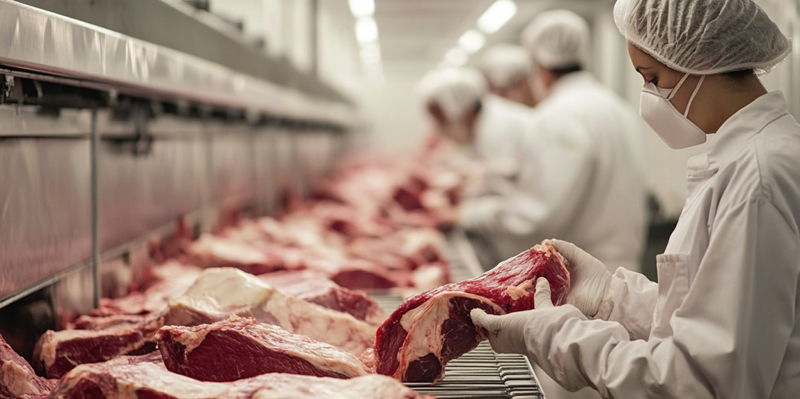In September 2024, alarming allegations surfaced against JBS USA, a prominent player in the meatpacking industry. These allegations exposed distressing scenarios of human trafficking, worker abuse, and exploitative labor practices at one of its beef processing plants located in Greeley, Colorado. United Food and Commercial Workers (UFCW) Local 7, a local union, spearheaded the drive, demanding U.S. authorities thoroughly investigate the company’s labor practices, which allegedly victimized as many as 500 French-speaking immigrants from Haiti and Benin. The union’s allegations bring to light a disturbing narrative of human exploitation and abuse, triggering a significant outcry for a comprehensive investigation.
Unveiling the Allegations
According to UFCW Local 7, the immigrant workers were recruited through TikTok and subsequently subjected to human trafficking. They faced exorbitant charges for basic necessities, such as job applications, transportation, and subpar housing, creating what the union describes as a vicious cycle of exploitation. The charges reportedly included excessive weekly fees ranging from $60 to $120 for extremely crowded and unsanitary living conditions, and up to $150 for transportation from Denver International Airport to their housing. Additionally, the workers faced weekly charges for their commute to the workplace, which only compounded their financial burden.
The allegations specify that these workers were forced to live in deplorable conditions, with some living in overpopulated houses where up to 40 to 50 individuals shared a five-bedroom, two-bathroom setup. Similar scenarios were reported in Evans, Colorado, and at a motel in Greeley allegedly paid for by JBS. These descriptions paint a grim picture of the daily realities faced by the immigrant workforce, underscoring severe violations of human rights and labor regulations. The UFCW emphasized the dire need for immediate intervention to address these inhumane conditions and protect the affected workers.
Historical Context and Demographic Shifts
The Greeley facility has been under scrutiny before for various controversies. In 2021, JBS agreed to a $5.5 million settlement for a lawsuit involving racial and religious discrimination against Black, Somali, and Muslim employees. This history highlights long-standing issues within the company’s labor practices, suggesting a pattern of worker exploitation and rights violations. Additionally, the recent demographic shift at the Greeley plant, with a significant rise in French-speaking African immigrants among the new hires, is notable. This influx includes many Haitian refugees, reflecting broader migration trends and economic pressures faced by vulnerable populations.
Over the past few years, this shift in workforce demographics has become increasingly pronounced, raising questions about the company’s recruitment practices and the systemic vulnerabilities that lead to such exploitation. The union asserts that these demographic changes are not coincidental but part of a broader strategy to capitalize on the desperation of these immigrant workers, thereby perpetuating a cycle of exploitation. This assessment calls for a closer examination of JBS’s hiring policies and the inherent risks posed to immigrant workers in the meatpacking industry.
Corporate Response and Union Advocacy
JBS has publicly stated that it did not impose any charges for pre-employment services and has pledged to cooperate with local authorities to address these serious allegations. The company mentioned hiring new human resources leaders at the facility as part of its response. Despite these assurances, the union remains skeptical, emphasizing the need for a thorough investigation by multiple regulatory bodies, including the U.S. Department of Labor, the National Labor Relations Board, and the U.S. Postal Inspection Service. This proactive stance by the union underscores the critical importance of regulatory oversight in safeguarding worker rights and ensuring corporate accountability.
The union’s advocacy extends beyond merely reporting the allegations—they have also been active in mobilizing public opinion and pressing for swift legal action. By presenting their findings to various regulatory entities, the union seeks to ensure that the grievances of these immigrant workers are addressed comprehensively and justice is served. This robust approach aims to not only rectify the immediate issues at the Greeley plant but also to set a precedent for the industry, emphasizing the need for ethical labor practices and protection of vulnerable workers everywhere.
Implications for Corporate Ambitions
The repercussions of these allegations extend beyond immediate legal and regulatory consequences. JBS’s ambitions to list shares on a U.S. stock exchange may now be under significant threat. The company’s public image and credibility are at stake, and its ability to attract investors could be compromised by ongoing controversies surrounding its labor practices. Activists and environmental groups have already begun voicing concerns about the listing’s implications for shareholder rights, environmental protocols, and human rights protections. This heightened scrutiny serves as a reminder of the critical importance of ethical conduct and transparency in corporate governance.
For JBS, navigating this crisis will require more than just surface-level changes—it necessitates a fundamental reevaluation of its labor practices and a commitment to genuine reform. The company’s response in the coming months will be closely monitored, not just by regulatory authorities but also by potential investors, consumer advocacy groups, and the broader public. This situation underscores the broader principle that ethical business operations are not merely a legal obligation but a cornerstone of sustainable corporate success and reputation.
Conclusion: A Call for Systemic Change
In September 2024, serious allegations emerged against JBS USA, a leading entity in the meatpacking sector. These claims highlighted disturbing situations involving human trafficking, worker mistreatment, and exploitative labor conditions at their beef processing plant in Greeley, Colorado. United Food and Commercial Workers (UFCW) Local 7, a local union, led the charge, urging U.S. authorities to conduct a thorough investigation into the company’s labor practices. These practices allegedly affected up to 500 French-speaking immigrants from Haiti and Benin. The union’s accusations have uncovered a troubling story of human exploitation and abuse.

